If you recently graduated college – or you’re about to – and you haven’t got a prestigious job lined up, you’re not alone. Far from it.
Maybe you’re wondering whether college was a mistake, or whether you chose the wrong major, or how you’re going to pay off your student debt. Maybe you simply don’t know what kind of career you’re passionate about pursuing yet and you’re worried you’ll figure it out too late.
Even if you went to a prestigious school and worked hard to pad your resume with societies, volunteering experience, and internships, the odds are you’re competing against a lot of talented, ambitious graduates just like you who did the exact same thing – because that’s what we’re advised to do from kindergarten age.
Don’t lose hope.
While it’s true that college alone isn’t enough to make you stand out in the eyes of prospective employers, there are plenty of ways you can set yourself up for success, starting right now.
Below, read the story of how our Chief Operating Officer went from being exactly where you are now to being the COO of a successful company in just five years, followed by actionable tips to help you stand out to prospective employers – while figuring out what kind of work makes you excited to get out of bed in the morning.
Story Time: From Unemployed Graduate to COO
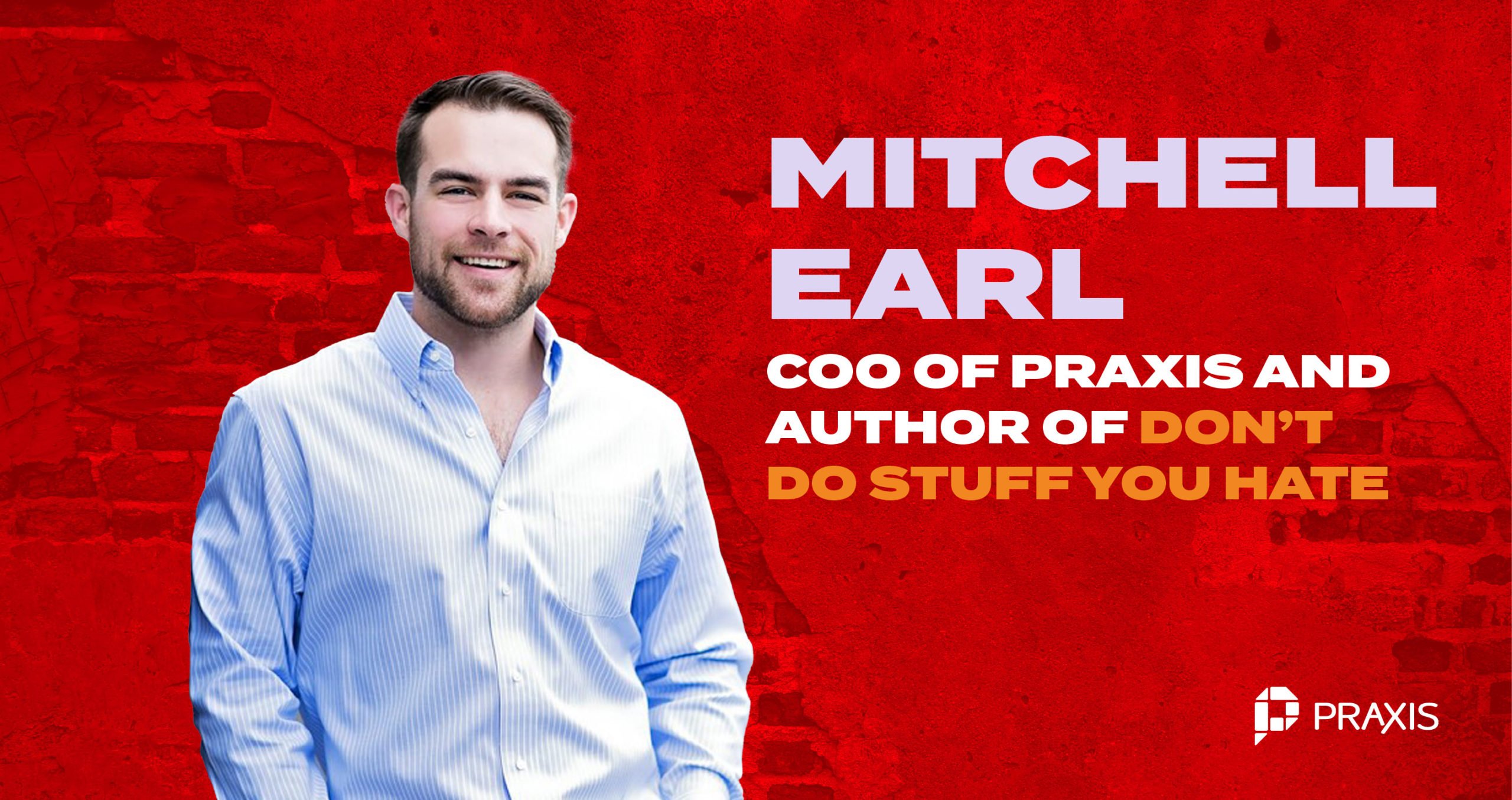
Mitchell Earl, COO of Praxis and author of Don’t Do Stuff You Hate
When Praxis COO Mitchell Earl graduated from college, like you, he didn’t have a cushy job lined up. He was embarrassed, feeling like all his friends and family were quietly judging him, but he didn’t let that stop him from going out and finding a job.
It might not have been the type of job his peers expected him to get, but it was a job nonetheless, and it paid the bills while he tried to figure out what to do next.
Mitchell soon learned something valuable: finding out what you don’t want to do is the easiest way to find out what you do want to do.
For the next couple of years, he bounced around from job to job, staying in each place until something better – more interesting, more promising in terms of personal and professional growth – came along. Each jump was a new experiment.
In each job, he worked hard, learned as much as he could, and tried to create as much value as possible, but when the time came, he’d take action and make the jump to a new opportunity.
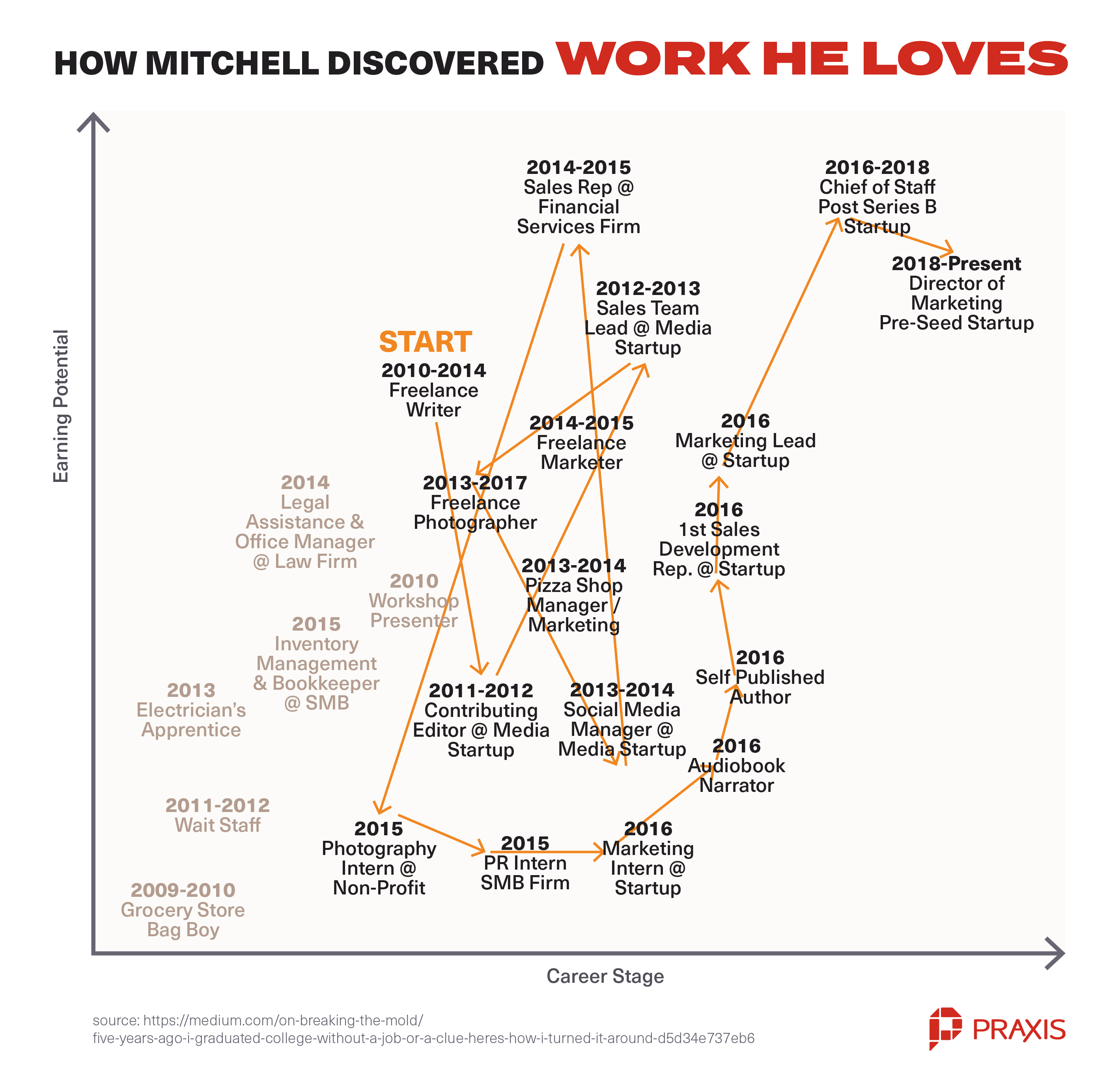
Each job showed him a little bit more about which kinds of work he hated, and which kinds of work made him come alive.
In pursuit of work he found meaningful, Mitchell wasn’t afraid to take two steps back (or take a pay/seniority cut) in order to take a step in the right direction.
With this knowledge, paired with a wide array of varied experiences, he co-authored a book called Don’t Do Stuff You Hate, and within five years of graduating, he had become the youngest member of the leadership team of multiple startups and increased his income tenfold. The best part? He found work he loves, and through Praxis, he’s helping others to do the same.
Read the whole story here.
Tips: What to Do After College to Make Yourself More Employable
A lot of people are probably giving you advice about fine-tuning your resume, collecting references, doing practice interviews, and other well-intentioned practical advice. While this advice is certainly helpful, using the tactics outlined below will have a much bigger impact.
Reduce Your Cost of Living
The lower your cost of living, the more freedom and flexibility you’ll have to experiment and find work you love.
Look at your budget (and if you don’t have one yet, create one) and find ways to cut costs wherever you can. Could you move to a cheaper place? Get a roommate? Move back home? Use public transport or get a bicycle? Eat out less?
When you start out earning a high salary, it’s very difficult to change gears to a lower income further down the line.
The lower a standard of living you’re comfortable with, the less you’ll need to worry about how well potential career paths pay, which will allow you to select opportunities based on how much potential for learning and growth they offer.
Gain a Variety of Experiences
The more varied work experience you gain, the more knowledge you’ll have of not only how different businesses operate and how to perform different roles effectively, but also what type of work you enjoy.
If you already have an idea of which line of work you’d like to go into, find the easiest, fastest way to test drive this career to test whether it’s a good fit for you. This may mean doing an internship, taking an entry-level job, or even working for free.
Decide in advance how long you’ll run each “experiment” before moving on to a new one – but give it at least 3-6 months to get allow yourself time to adjust and learn the ropes before you jump ship.
If you’re not sure what kind of career appeals to you, think about companies you admire and would like to work for and reach out to them.
Whichever opportunities you get, go out of your way to be the best employee they’ve ever had. Show up early. Go the extra mile. Find ways to add value over and above your job description and paygrade.
Each time you make a jump to a new career opportunity, sit back and reflect on your previous experience. Ask yourself these questions, and for each question, follow up with “Why?”:
- What did I enjoy?
- What bored me to tears?
- What was I good at?
- What did I struggle with?
- What made me feel challenged?
- What made me feel invigorated?
- What scared me?
- What aligned with my passions and values?
- Which skills did I learn?
Every time you perform this little ritual of self-reflection, you’ll come a few steps closer to finding a career that makes you feel alive. So don’t be discouraged if you don’t figure it out right away. It might take numerous different jobs before you find a career that’s the right fit for you
In a way, not having a “career job” lined up right out of college is a good thing, because it can be difficult to switch jobs once you get comfortable, especially if you started out earning a higher salary. With career jobs, it’s also much more of a red flag to prospective employers if you don’t stick around for at least a year or two, whereas nobody really cares how long you worked in “gap jobs.”
And by the way, the idea that you need to find something to do “for the rest of your life” is rubbish. 2019 data analysis by the Bureau of Labor Statistics shows that the average Baby Boomer (born in 1957-1964) held 12.3 jobs between the ages of 18 and 52.
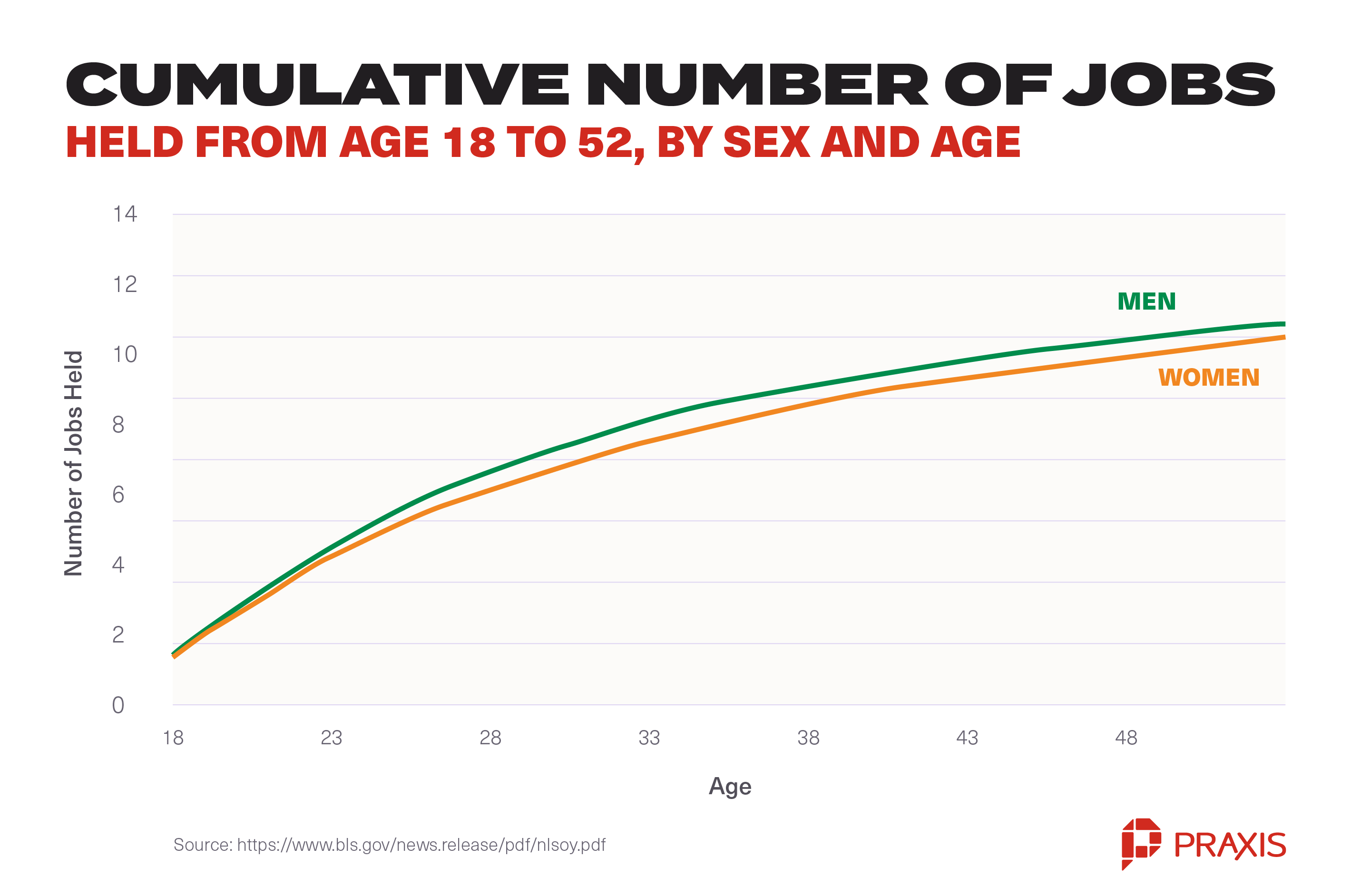
That number is expected to rise given the fact that Millennials are notorious for changing jobs frequently, with 21 percent reporting job changes in the past year according to a Gallup survey. Changing jobs is hardly a new phenomenon, but it’s becoming more normalized to do so often, which means employers are less likely to see it as a red flag. In fact, 75 percent of millennial-age managers believe that job-hopping has advanced their careers.
People change, constantly. What gets you fired up now might look very different five years down the line. Don’t let the thought of a one-track career stretching on indefinitely until you retire scare you or make you avoid certain jobs just because you “can’t see yourself doing this forever.”
Take it one step at a time and keep reflecting on your experiences as you go along so you don’t waste too much time working unfulfilling jobs without realizing it. If you’re constantly “taking your temperature” about how you feel about what you’re doing, you’re in a better position to make decisions that make you feel fulfilled and happy.
If you need help landing opportunities, read our blog Getting Your Foot in the Door: 3 Essential Habits That Matter More than Your Resume.
Start Creating Value
The single most important thing when it comes to landing a job – and excelling at it – is being able to create value for your employer.
But first, you need to be able to persuade prospective employers that you can create value for them.
But how do you do signal your value?
There are two main ways to achieve this.
The first is by building a digital paper trail that demonstrates your skills, interests, mindset, and commitment to anyone who’s interested.
Whether it’s through your Medium blog, your portfolio on your website, your Twitter or LinkedIn account, your Quora answers or your Goodreads profile, documenting your projects, learnings, thoughts, and interactions with content you’ve consumed gives people insight into who you are as a person, how you think about the world, and how you approach challenges.
The second way is by creating a value proposition that sets you apart by showing prospective employers that you’re a good investment.
A value proposition shows employers that you have a plan to create value for them and possess the skills, mindset, and experience to do it.
Learn more about how to create a value proposition in this video:
Develop a Bias Toward Action
Do you obsessively edit and rewrite every post before publishing it? Do you nitpick every detail of a project and never feel like you’re done? Do you tell yourself that there will be a better time to launch the project or business you’ve been thinking about for years?
Cut it out.
Cultivate a bias towards action: create a “minimum viable product” and do it. Whether it’s an article you put out into the world or an app that only has one function (so far), learn to accept that “good enough” is better than “perfect but unpublished.” Waiting until it’s perfect, or until the moment’s just right, or until you’re “ready” can carry a huge opportunity cost.
Don’t have the qualifications or experience listed in the job description? Apply anyway. Even if you don’t get the job, you’ll get practice applying and interviewing and get one step closer to landing your dream job.
That’s not to say you should act without thinking or as if there are no consequences. You should still have a plan and prepare as well as you can for any opportunity that comes your way, but get into the habit of saying “yes” and taking action.
Build A Vertical Network
One of the big arguments for going to college is that it helps you to build your professional network. The problem is, most of the people you meet in college are close to you in age and experience, which means it will likely take years for most of those connections to yield returns.
More than 80 percent of jobs are filled through networking, but for a network to be truly effective, it should span professionals at all levels of business. Instead of a horizontal network of peers, you want to cultivate relationships with people from all walks of life and levels of the corporate hierarchy.
Get a Sales or Customer Service Job
A job in sales or customer support may not seem very glamorous, but these jobs are two of the best ways to maximize your early work experience and learn highly marketable skills.
Why? Sales and customer service jobs require that you develop an intimate knowledge of the business’s value proposition and positioning and force you to interact with customers and learn to solve problems on the fly. These jobs will also hone your communication and persuasion skills and give you insights into the ways your company can improve its offering to better address customers’ needs – knowledge that will help you to create value for your employer.
Embrace Self-Driven Education
I know, I know. You just graduated from college, so further education might be the furthest thing from your mind. But the sad truth is that even the best colleges leave graduates woefully unprepared for the demands of the workplace. There’s a huge divide between the skills employers seek and the skills graduates emerge from college with.
According to research by Pearson, 87 percent of companies say graduates lack the skills needed to do their job and require significant training before they can perform their roles effectively.
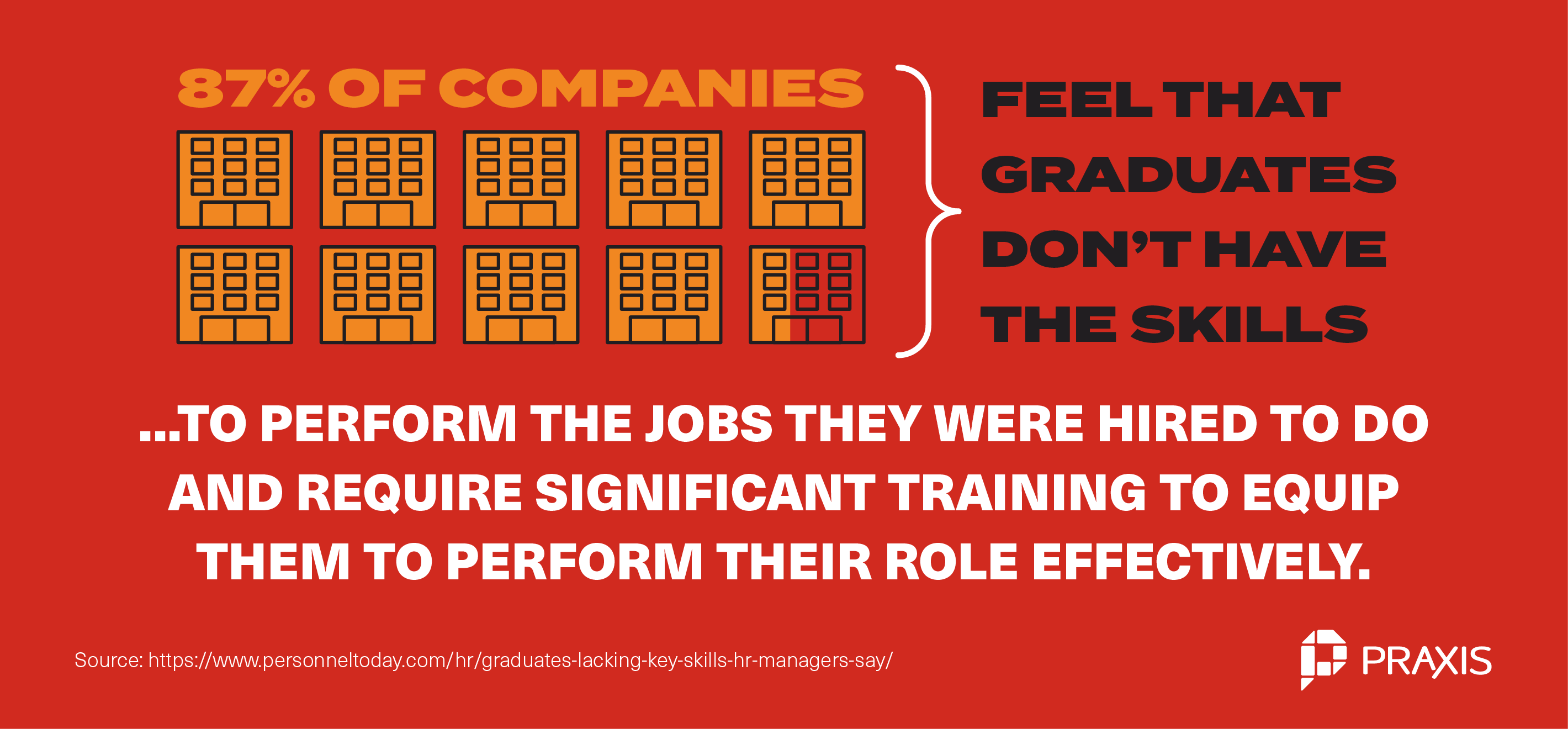
One of the best things you can do to improve your odds of getting hired – and doing your job well – is taking your education into your own hands and learning useful skills.
Want to work at a specific company? Have a look at their open jobs and make a list of the skills they’re seeking and see how these stack up against your current skillset. Then make a plan to develop and practice those skills. Read our post on self-directed learning to find out more about creating your own curriculum and learning efficiently.
Get a Headstart the Praxis Way
If reading this made you feel inspired to kick your career into gear but you feel like you could use more guidance and mentorship to get you started, Praxis is exactly what you need.
The 12-month Praxis program will expose you to a variety of work experience in fields like sales, customer support, marketing, and business operations and help you develop critical skills that complement your interests.
In the first six months portion of the program (the bootcamp), you’ll learn to thrive as a self-directed learner and work on real projects that help you build your digital footprint and demonstrate your ability to create value alongside other inspired, ambitious individuals on the same journey.
During this time, we’ll also help you find – and land – a job with a growing company that matches up with your interests and skills, and provide ongoing support and mentorship for your first six months as a full-time employee.
Praxis is designed to put you in control of your career and shorten the journey from graduation (whether it’s from high school or college) to finding a job that you love that pays the bills.
The average first-year income for graduates is $50K while tuition costs just $12K, which means that, on average, most participants end up earning more than the cost of the program before they even graduate.
We believe in putting skin in the game, which is why we offer the Praxis guarantee: if you’re not hired full-time within six months of completing the bootcamp, you don’t pay a cent.
Want to find out more? Hit us up in the chat or check out our program guide for more information. If you’d like to know more about how Praxis works, read our blog Self-Directed Learning: A Primer for Ambitious Young Adults.
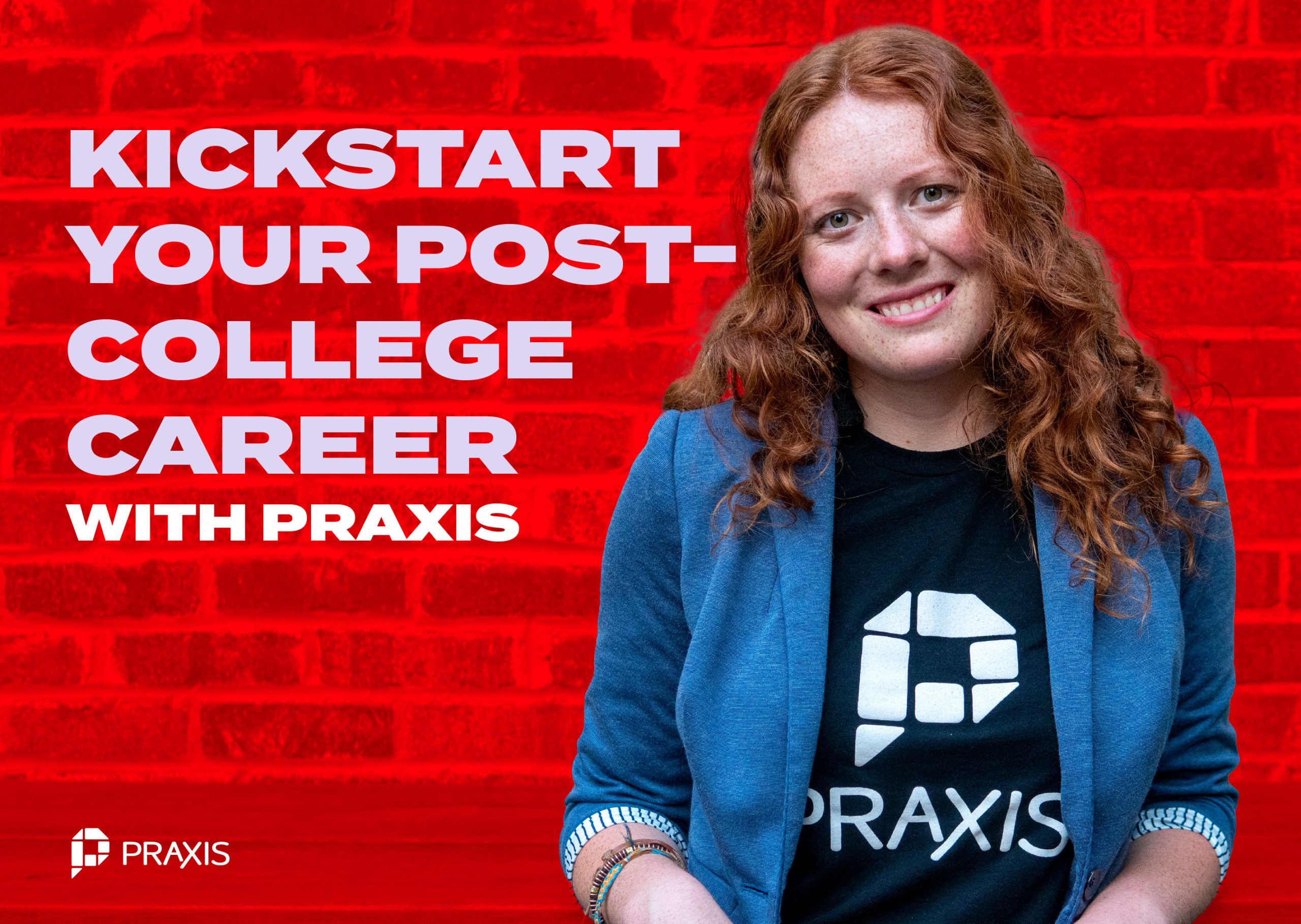
Tags:
Career DevelopmentDecember 1, 2020
